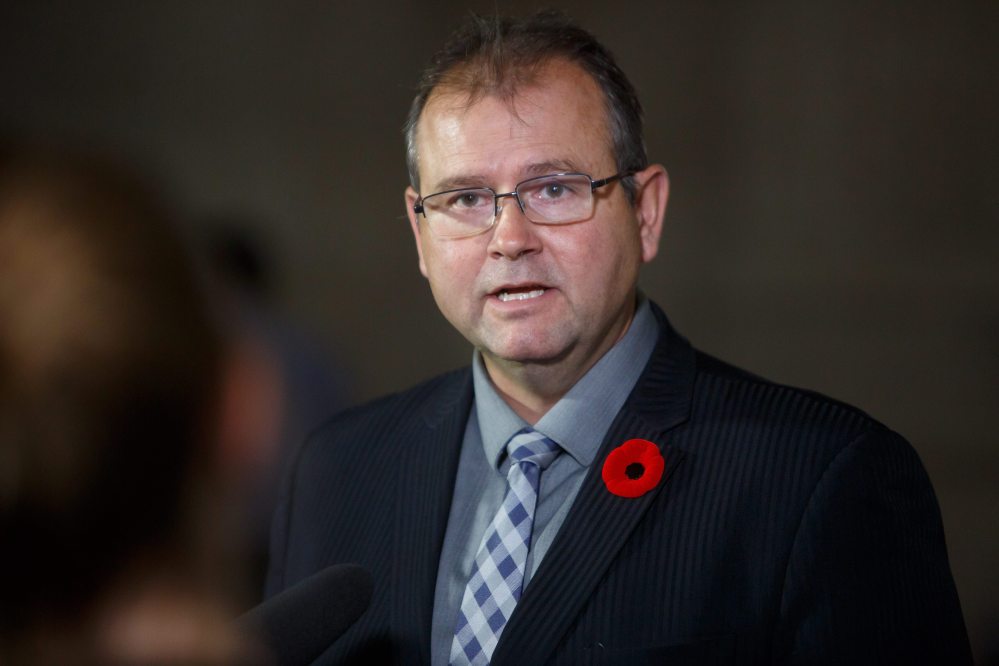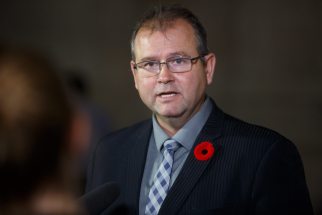Manitoba mulls teacher-misconduct registry, college of educators
Read this article for free:
or
Already have an account? Log in here »
To continue reading, please subscribe:
Monthly Digital Subscription
$0 for the first 4 weeks*
- Enjoy unlimited reading on winnipegfreepress.com
- Read the E-Edition, our digital replica newspaper
- Access News Break, our award-winning app
- Play interactive puzzles
*No charge for 4 weeks then price increases to the regular rate of $19.00 plus GST every four weeks. Offer available to new and qualified returning subscribers only. Cancel any time.
Monthly Digital Subscription
$4.75/week*
- Enjoy unlimited reading on winnipegfreepress.com
- Read the E-Edition, our digital replica newspaper
- Access News Break, our award-winning app
- Play interactive puzzles
*Billed as $19 plus GST every four weeks. Cancel any time.
To continue reading, please subscribe:
Add Free Press access to your Brandon Sun subscription for only an additional
$1 for the first 4 weeks*
*Your next subscription payment will increase by $1.00 and you will be charged $16.99 plus GST for four weeks. After four weeks, your payment will increase to $23.99 plus GST every four weeks.
Read unlimited articles for free today:
or
Already have an account? Log in here »
Hey there, time traveller!
This article was published 02/11/2022 (1130 days ago), so information in it may no longer be current.
Manitoba is considering the creation of both a teacher registry and an independent body or college of educators to improve accountability and transparency related to educator misconduct in K-12 schools.
But the province has made no firm commitments to change.
On Wednesday — hours after the Canadian Centre for Child Protection released a scathing report highlighting the absence of transparency around educator misconduct in Manitoba — the Stefanson government revealed details about its plans to address and prevent malpractice.
“When you talk about either an independent (body) or a college, those are a couple options that we’re going to be speaking to our education partners on… to ensure our children and youth are safe right here in Manitoba,” said Education Minister Wayne Ewasko.

Education Minister Wayne Ewasko said, in a news release, consultations will be held with all relevant stakeholders to get perspectives from students, parents, guardians, teachers and school administrators.
Other changes proposed by the government include: defining professional misconduct that needs to be reported to the education department; public reporting processes including the development of a teacher registry; updating protocols related to the Certificate Review Committee and its composition; and standardizing mandatory training and professional learning.
Ewasko, a former teacher, said the province will hold consultations with stakeholders to get perspectives from students, parents, guardians, teachers and school administrators.
“Some of these changes are long overdue. For example, reporting offences and things of that nature when it comes to teacher misconduct to a centralized board,” said Cameron Hauseman, an assistant professor of educational administration at the University of Manitoba.
“That’s a great idea so these things can be tracked over time and so that we can prevent people who don’t belong in a classroom from getting there in the first place or from being allowed back in after engaging in those kinds of behaviours.”
A months-long Free Press investigation into secrecy surrounding teacher misconduct within Manitoba has led to calls from critics for the province to take steps similar to what the Centre for Child Protection wants to see: make discipline public and create an independent body to investigate and adjudicate complaints.
A public registry ensures employers anywhere can search a Manitoba educator’s record, Hauseman said, adding wrongdoers cannot skirt the consequences of their actions by moving to another jurisdiction.
Ontario’s database allows users to search profiles that include a teacher’s academic and technological qualifications, areas of expertise, and whether or not they are in good standing. B.C. maintains a system with similar entries.
“Some of these changes are long overdue. For example, reporting offences and things of that nature when it comes to teacher misconduct to a centralized board.”–Cameron Hauseman
Earlier this year, Alberta launched an online teacher registry that Hauseman likened to what Manitoba is proposing. The western province, unlike Ontario and B.C., opted not to create a regulatory body alongside its database.
Every province and territory should have an independent oversight body that investigates and adjudicates cases of teacher misconduct and should make cases of teacher discipline public, according to the Winnipeg-based Canadian Centre for Child Protection.
In its 2022 report, the centre also requested child sexual abuse prevention and awareness training be made mandatory at the school level and trauma-informed support for victims be available in every jurisdiction.
The Manitoba Teachers’ Society is tasked with overseeing its members’ conduct. The union, which represents upwards of 16,000 public educators, is required by law to publish decisions related to misconduct involving teachers.
JESSICA LEE / WINNIPEG FREE PRESS FILES The Manitoba Teachers’ Society, which represents upwards of 16,000 public educators, is required by law to publish decisions related to misconduct involving teachers.
In recent months, the union has come under scrutiny because critics argue there is no evidence it is complying with its obligation to publish information about malpractice. Asked if the province is doing anything to compel the union to follow the law, Ewasko would only say MTS has its own bylaws. Asked if he considers it a conflict of interest for the union to investigate its own members, Ewasko would only say conversations about “whether it is specifically a conflict or it’s not” continue.
The society has long been opposed to the creation of a teachers college. It claims such an institution would set up a parallel system to the existing “rigorous review process,” and create confusion, while the most egregious incidents end up public via the courts.
In an interview Wednesday, MTS president James Bedford said there is a need for the “development of teaching standards” but he maintained the province has suggested via its Manitoba education action plan that it is not actively pursuing a college of teachers.
While it remains unclear what a teacher registry might look like, Bedford said he has privacy concerns.
“There are certain privacy issues that surround that registry because like all of society, we have members who, for very legitimate legal purposes, don’t want the world to know where they live and where they work. It’s unfortunate for individuals that this occurs but it is often a court-ordered mandate of privacy because of any number of reasons. Usually, it flows out of domestic relationships, and so we need to ensure that there’s privacy involved in this,” he said.
MIKAELA MACKENZIE / WINNIPEG FREE PRESS FILES MTS president James Bedford said there is a need for the “development of teaching standards” but he maintained the province has suggested via its Manitoba education action plan that it is not actively pursuing a college of teachers.
The commission tasked with reviewing the K-12 education system in 2019 made several recommendations related to regulating the teaching profession. Recommendation No. 2 of 75 in its final report called for the creation of “a Manitoba College of Educators” for individuals with teaching certificates. The commission suggested other school employees be granted an associate membership status.
A college would strengthen public interest and confidence in teachers, oversee their training and certification, provide transparency and accountability, maintain high standards for educators, provide accreditation of faculties of education, and promote quality, excellence and professionalism, per the commission.
The authors of the report recommended the province also establish a college governing council run by both educators and members of the public “to enhance public confidence in the work of the college.”
So far this year, there have been several high-profile cases involving Manitoba teachers — including rural music teacher Jacques Normandeau, Winnipeg educator David Bueti and phys-ed teacher Kelsey McKay — who are alleged to have engaged in criminal wrongdoing involving students.
McKay, a successful football coach at Churchill and Vincent Massey high schools, is facing 30 charges related to sexual assault and exploitation involving former teenage athletes.
maggie.macintosh@freepress.mb.ca
Twitter: @macintoshmaggie
katrina.clarke@freepress.mb.ca
Twitter: @KatrinaAClarke

Maggie Macintosh reports on education for the Winnipeg Free Press. Funding for the Free Press education reporter comes from the Government of Canada through the Local Journalism Initiative.

Katrina Clarke is an investigative reporter with the Winnipeg Free Press.
Our newsroom depends on a growing audience of readers to power our journalism. If you are not a paid reader, please consider becoming a subscriber.
Our newsroom depends on its audience of readers to power our journalism. Thank you for your support.
History
Updated on Wednesday, November 2, 2022 8:10 PM CDT: Free press investigation details











